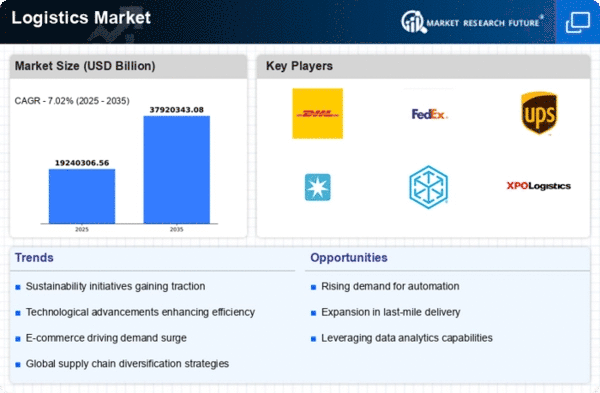Market Trends
Key Emerging Trends in the Logistics Market
One major development that is propelling the logistics industry is digitalization. Using cutting edge technology improves supply chain visibility. To meet the demands of online shoppers and tackle the difficulties of last-mile delivery, logistics companies are making investments in infrastructure and technology. Robotic picking, packaging, and sorting technologies in automated warehouses improve efficiency and precision. Businesses adjust to manage several sales channels with ease, combining online and offline activities. Logistics companies are putting plans into place that allow orders to be fulfilled quickly and effectively, no matter which channel a customer chooses to purchase from. Predictive logistics relies heavily on data analytics. Logistics companies estimate demand, adjust the quantity of stock, and proactively handle possible supply chain interruptions by using data-driven insights. The increasing prevalence of products with special temperature requirements in global trade, like vaccines and perishable goods, is driving up demand for temperature-controlled shipping and storing solutions. Managing risks in logistics is becoming more important due to issues associated with global trade, such as geopolitical unpredictability and the effects of pandemics. These technologies are being adopted by logistics companies to guarantee more seamless cross-border movements and regulatory compliance. Logistics providers adjust to the intricacies of shipping abroad, customs regulations, and varying customer expectations when firms grow internationally. Logistics plans that focus on the customer are becoming more important. Logistics companies place a strong emphasis on improving the client experience by offering clear tracking, precise arrival estimates, and helpful customer support. Maintaining customers and building enduring relationships depend heavily on meeting and exceeding their needs. The rise of micro-fulfillment facilities has caused an evolution in urban logistics. Logistics companies are setting up smaller fulfillment facilities nearer to customers in urban regions to shorten delivery times and deal with issues related to crowded urban settings. Urban customers' requests are more efficiently met by micro-fulfillment centers. The focus on sustainable returns in reverse logistics has begun to gain traction. Product return handling becomes increasingly important as e-commerce expands. Logistics companies are putting into practice eco-friendly procedures to handle returns, cut down on waste, and make it easier for goods to be efficiently returned to stock or recycled.


















Leave a Comment